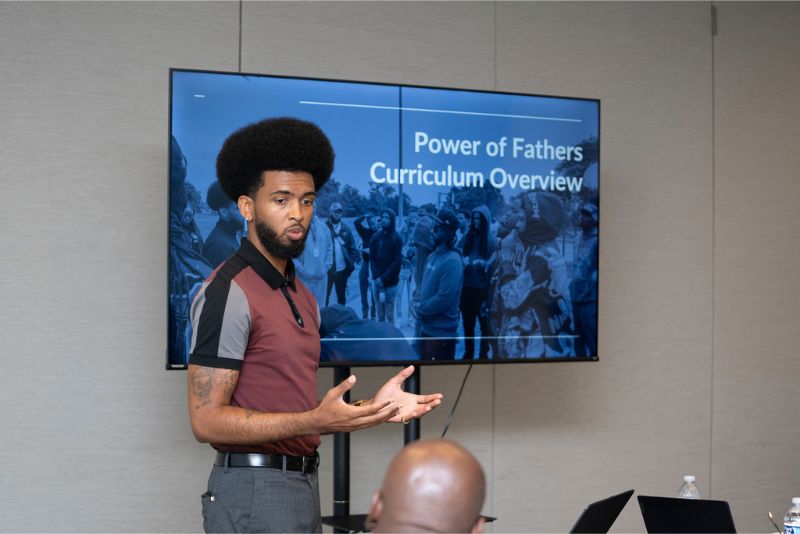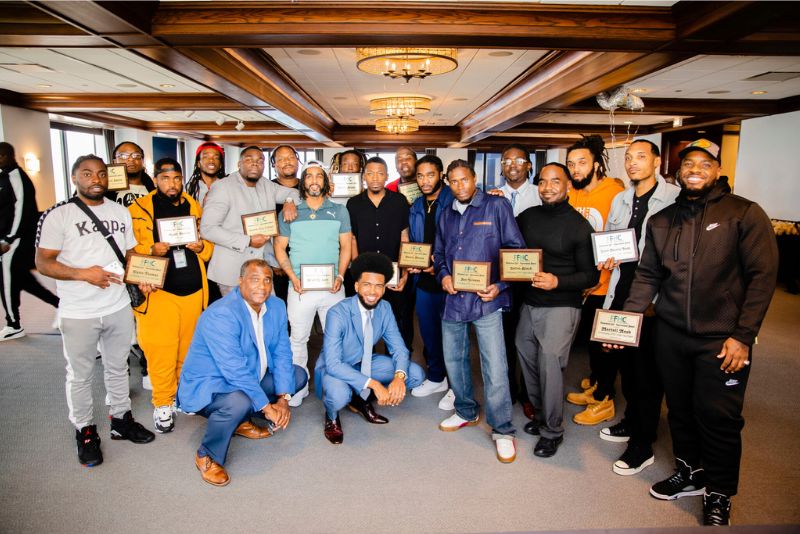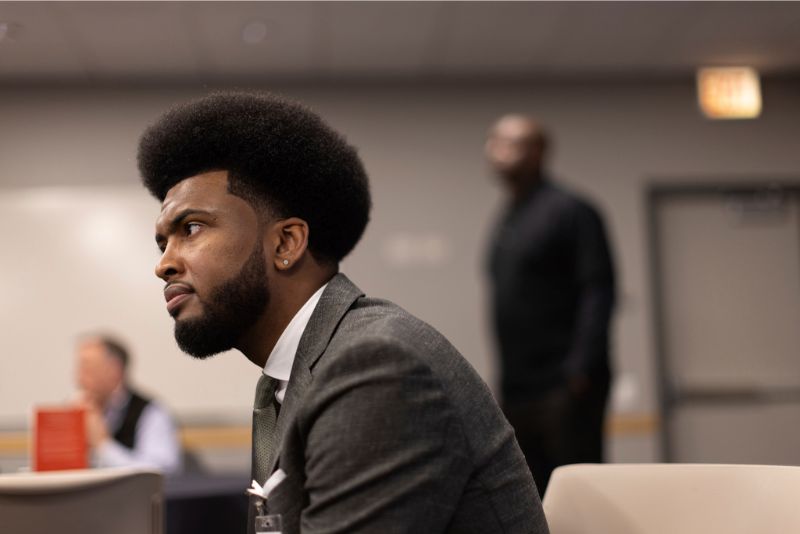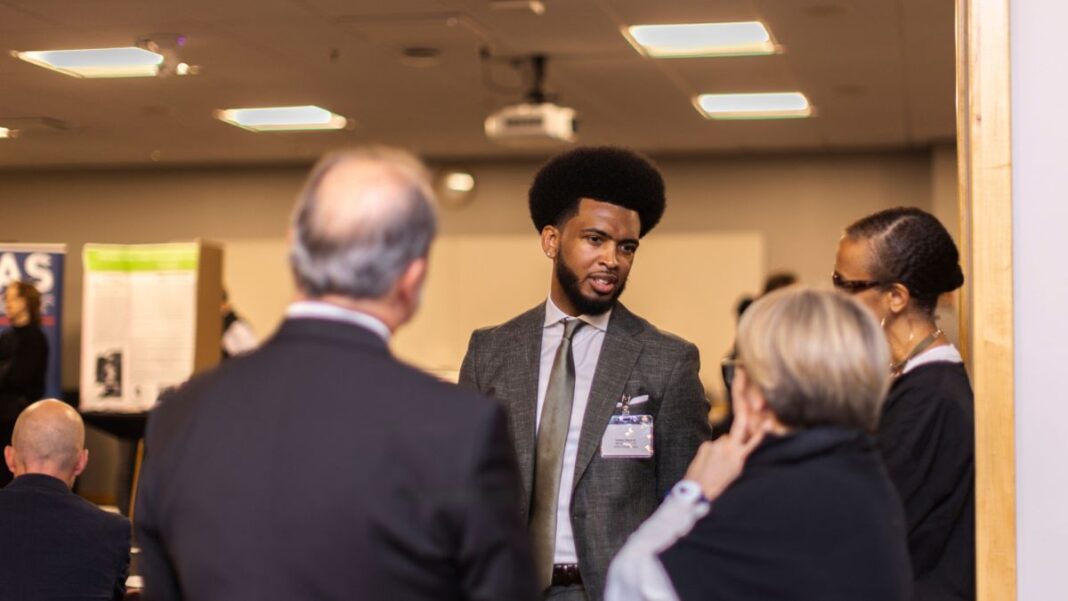Dr. Clinton Boyd Jr., executive director of Fathers, Families & Healthy Communities, shares his personal journey, mission, and vision for empowering Black fathers and building stronger communities through healing, education, and faith (All Photos Courtesy of Dr. Clinton Boyd Jr.).
As an advocate for uplifting Black men, I had the opportunity to meet Dr. Clinton Boyd Jr. in April at The Imperative of Investing in Black Men and Fathers in Chicago, an event hosted by the City Club of Chicago.
In 2021, Dr. Boyd Jr. became the executive director of Fathers, Families & Healthy Communities, bringing both lived experience and academic expertise to the role. He embodies the power of collaboration and community building, consistently advocating for the vital role these efforts play in driving meaningful change for Black men and fathers, particularly in areas such as education, financial empowerment and mental health.
In this Interview, he reflects on the importance of standing in solidarity with like-minded brothers who share the same commitment to empowering men, fathers, women and children within Black communities.
Partnering with organizations like EAT (Equity and Transformation) has been an honor for Dr. Boyd, as their missions align with serving the same population of Black men, fathers and the community.
While his commitment to empowering Black men is grounded in a deep sense of brotherhood and mission-driven partnership, his work is ultimately fueled by the belief that collective effort and shared purpose are key to transforming lives and building stronger communities. For him, this dedication goes beyond professional duty. It is personal and central to who he is.
Marshelle Sanders: Hi, Dr. Boyd. Thank you so much for your time and the opportunity to chat with us at The Chicago Defender. You mentioned at the event in April that you were a young father yourself. Could you provide a brief recap of your journey and how it led you to this mission?
Dr. Clinton Boyd Jr: Absolutely. I became a father at the age of 15. That experience transformed me—it broke me down and rebuilt me simultaneously. I was still trying to figure out who I was, and suddenly I had to be responsible for someone else’s life. Holding my daughter for the first time forced me to reflect deeply on who I was becoming. I had to choose: Would I be defined by the limitations the world placed on me, or would I break through those constraints and create a new path? I chose the latter.
The world expected me to fail, to disappear. But fatherhood gave me purpose. It became the reason I stood up. It has been the foundation of everything I’ve done, both personally and professionally. And that’s why I fought so hard for Black fathers today. I know what’s possible when we’re not ashamed or judged but are seen, supported and surrounded by love.

Sanders: What advice would you give to young fathers today who may be going through what you once did—young, scared, and unsure of what’s next?
Dr. Boyd Jr: The first thing I’d say is to have faith in God. Truly believe He’ll make a way out of no way—but make sure your actions align with that belief. Next, lean deeply into your support systems. I was fortunate to have parents, grandparents, my co-parent and an extended family who all supported me unconditionally. Without that network, I wouldn’t have been able to make it. Don’t take those people for granted. God places special people in our lives to help us find our way.
And finally, discover your life’s purpose. Becoming a father so young helped me realize mine. I knew I wanted to support Black men and fathers, and that clarity gave me direction. I encourage young fathers to tap into what they’re passionate about and pursue it with intention, making it a reality.
Sanders: Let’s talk about education. You stated how school helped shape your path. How did you navigate that journey while being a young father, and how did education help you discover your purpose?
Dr. Boyd Jr: That’s an important question. I’d always been told I was intelligent and capable, but like many young boys, I got caught up in things outside of school. That lack of focus is part of what led me to become a young father. But pursuing education changed everything. It gave me tools, access, and perspective—and it ultimately put me in the position I’m in today.
I had to be strategic and patient. I made careful decisions about where I went to school, how I’d fund it and how I’d finish, not just start. From undergraduate studies to a Ph.D. and then a postdoctoral position at Duke University, every step was intentional.
However, I want to emphasize this point strongly; it’s not just about attending school. It’s about receiving the proper education, one that reflects who we are and speaks to our cultural heritage.
Too often, our young men aren’t dropping out—they’re being pushed out by systems and educators who don’t understand or value them. Curricula usually begin our history in 1619, overlooking the vast and rich legacy that preceded it. Our young people need to see themselves in what they’re learning, and until education centers our history, values and contributions, it will continue to miss the mark.
Sanders: Tell us more about the organization, Fathers, Families & Healthy Communities. What’s your mission, and why is this work so essential today?
Dr. Boyd Jr.: At Fathers, Families & Healthy Communities, our mission is straightforward: to enhance the quality of life for Black fathers in Chicago and beyond. We believe that Black fathers are essential to the safety, stability and strength of our families and communities.
For too long, society has treated Black fathers as liabilities, not assets. Our work is about rewriting that narrative. We want Black men and fathers to be revered, not feared. To be recognized as the valuable contributors they are, not just to their families but to the broader community.
We take a comprehensive approach. We offer peer support groups, health and wellness services and legal aid in areas such as child support and custody. Additionally, we work to connect our men with jobs of the future. We also partner with other organizations throughout the city to advance this mission.
This is more than a program—it’s a movement to uplift and empower Black fathers to thrive, because when they thrive, so do our families, and so does our community.

Sanders: Dr. Boyd, I appreciate that you highlighted particularly the depth of involvement fathers have in shaping FFHC’s work. Can you expand on that?
Dr. Boyd Jr: One of the things that truly sets FFHC apart is that we see our fathers as partners, not just participants. They actively co-design and co-develop everything we do, from our programs to our policy and advocacy work. We employ a bottom-up approach, rather than a top-down one, and this philosophy is deeply ingrained in our organizational values.
Much of our work is inspired by an Afrocentric worldview, which emphasizes communalism over individualism. We intentionally move away from that rugged individualism often celebrated in American culture. Our ancestral and cultural history has always prioritized the community over the individual. We operate from that same framework because it honors who we are at our core.
Sanders: I love that. And it’s why highlighting organizations like FFHC is so important, so people know where to turn. Sometimes, people need to see that help is available.
Dr. Boyd Jr: Exactly. Additionally, I want to highlight that Black men and fathers founded FFHC, and they have historically led it. I take tremendous pride in building upon the foundation that was laid before me. That legacy matters. I don’t take it for granted.
Sanders: I appreciate your leadership, and it matters to so many of us. Now, from your years of working with Black men and families, what have you learned? And why do you feel it’s important to keep sharing your approach?
Dr. Boyd Jr: That’s a great question. I’ve learned so much from the men we serve—but the biggest takeaway is this: The myth that Black men and fathers don’t care about their families is just that—a myth. What I’ve consistently seen is the complete opposite.
Despite the obstacles, our men show up. They love their children, their families and their communities—and they’re doing their best to provide and to be present. The reality is that they’re often scapegoated for systemic failures, such as being locked out of the legal economy or being unable to access the types of jobs that would allow them to thrive and support their families in meaningful ways.
Sanders: That part. It’s not about a lack of will—it’s about a lack of access.
Dr. Boyd Jr: Exactly. And another thing I’ve learned: if you build it, they will come. There’s this false narrative that Black men don’t want support, but that’s not what we’ve experienced. What they don’t want is to be met with judgment, dismissal, or disrespect.
When support comes from the heart, it reaches the heart. And the men we work with—when given the space and respect—show up ready and willing to do the work. But they need safe spaces. They need spaces where they can be emotionally vulnerable, where they can begin to process trauma and begin healing.
So many of our men are in pain—financially, physically, spiritually, socially—and they’re trying to cope in the best ways they know how. Our job is to offer them better options. And that’s where healing begins.
Sanders: I love how you connected the word “healthy” back to “healing.” That’s amazing, and I’m here for it
Dr. Boyd Jr: Yes, that’s the root of everything. At FFHC, when we talk about healthy communities, it starts with healed men. Our goal is to help our brothers heal and then send them back into a world that may have tried to break them, but this time with a restored sense of self, dignity, and purpose.
We want them to move through the world with self-love and self-respect, fully aware of their value. FFHC is a do-for-self organization—we believe in partnering with others. We welcome partnerships with like-minded organizations and stakeholders who share our vision and values.
But we do not compromise our values. We will not yield to external forces that don’t have the best interests of our fathers in mind. We’re here to walk with our men—no matter what they’re facing—and we do so with love, accountability, and unwavering belief in their potential.
At FFHC, we believe our men are more than the worst thing they’ve ever done. Redemption is not just a theme—it’s the foundation of our work.

Sanders: Dr. Boyd, that was inspiring, especially what you said about restoring Black men. It hit home for me. You wear many hats and do so much important work—what keeps you grounded and focused through it all?
Dr. Boyd Jr: Honestly, it’s my unshakable faith in God, specifically, the God of justice and righteousness. The deeper I go into this work, the more I lean on scripture to sustain me. It gives me strength, perspective, and constant reminders that I’m doing this for the right reasons.
Even when the work isn’t recognized the way I might hope, I remember that I’m walking in the footsteps of those who came before me. And that’s okay. I’m just one link in a much longer chain, doing my part while I can. My prayer is always for God to continue using me as an instrument of purpose and service.
Sanders: And finally, when you’re not working—when you’re just chilling and unplugging—what do you enjoy doing in your free time?
Dr. Boyd Jr: Spending quality time with my children is my greatest joy. I have a daughter and a son, and being present with them, watching them grow and bond, is everything to me. Especially as I get older, I’ve learned to be intentional about that time together.
I also enjoy reading and writing—it’s therapeutic for me. Recently, I’ve been getting into gardening and spending more time in nature, which has been grounding. I’ve also picked up fishing, and I love to barbecue. Grilling is one of my happy places.
Sanders: Okay, now we’re talking! I thought I saw you at a food event once—I’m pulling up next time. I’ll bring a plate!
Dr. Boyd Jr: (Laughs) Anytime! I can grill a mean lamb chop, and I’ve been experimenting lately.
For More information on how to connect with Dr. Clinton Boyd Jr. and the Father’s, Families & Healthy Communities, please visit www.ffhc.org.




